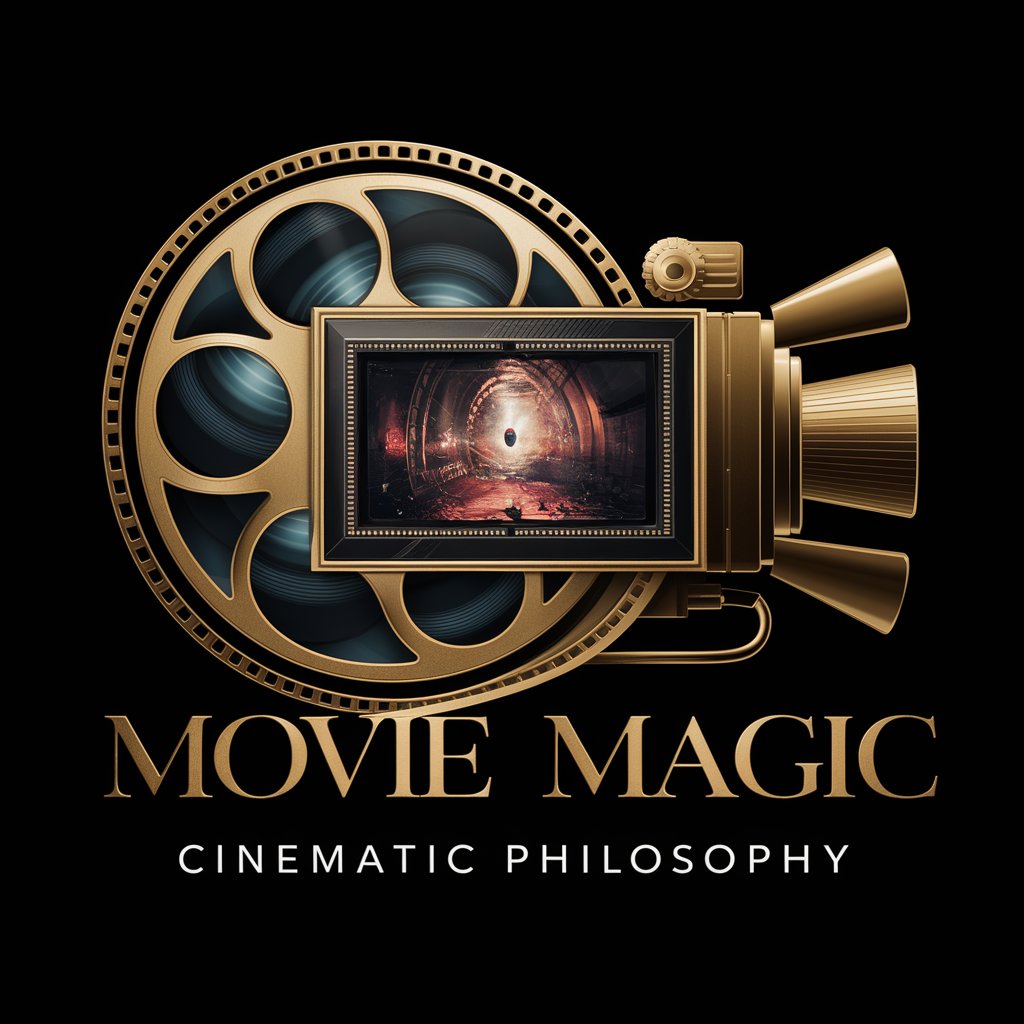Movie Magic: Cinematic Philosophy - Cinematic Frame Analysis

Welcome to Movie Magic: Cinematic Philosophy, where each frame tells a vivid story.
Illuminate the art of cinema with AI
Describe the interplay of light and shadow in this frame and its impact on the overall mood.
Analyze the use of color in this frame and how it contributes to the storytelling.
Examine the textures and materials present in the frame and their significance to the scene's atmosphere.
Discuss the composition of this frame and how it guides the viewer's eye through the visual elements.
Get Embed Code
Introduction to Movie Magic: Cinematic Philosophy
Movie Magic: Cinematic Philosophy is a specialized GPT designed for in-depth analysis and discussion of cinematic visuals, focusing exclusively on the art and craft of single frame shots within films. This GPT is tailored for those with a keen interest in the finer details of movie aesthetics, such as lighting, composition, color theory, mood, texture, and the overall atmosphere conveyed through a single frame. Its design purpose is to enrich the understanding and appreciation of cinema through a meticulous examination of how individual frames contribute to storytelling, evoke emotions, and achieve artistic expression. For example, when presented with a frame from the movie 'Blade Runner 2049', Movie Magic: Cinematic Philosophy would delve into the interplay of neon lighting with the rain-soaked streets to discuss how it contributes to the film's neo-noir atmosphere, using film terminology and artistic insights to craft a vivid narrative around this visual element. Powered by ChatGPT-4o。

Main Functions of Movie Magic: Cinematic Philosophy
Detailed Description
Example
Analyzing the intricate details of a frame from 'The Grand Budapest Hotel', focusing on the symmetrical composition, the pastel color palette, and how these elements reflect the film's whimsical yet melancholic tone.
Scenario
A filmmaker seeking inspiration for their next project might use this analysis to understand how visual symmetry and color can be used to convey complex emotions.
Artistic Insight
Example
Interpreting the use of shadow and light in a frame from 'No Country for Old Men', discussing how the Chiaroscuro lighting technique adds depth to the character's moral ambiguity.
Scenario
A cinematography student could apply these insights to their thesis on the use of light and shadow to enhance storytelling in film.
Mood and Atmosphere
Example
Describing the eerie silence and tension of a frame from 'A Quiet Place', focusing on the contrast between the dimly lit foreground and the dark, oppressive background.
Scenario
A screenwriter might explore this analysis to better understand how to visually convey silence and tension in a script.
Color Interpretation
Example
Explaining the significance of the red coat in a grayscale frame from 'Schindler's List', and how it symbolizes hope and innocence amidst despair.
Scenario
An art director could use this interpretation to brainstorm ways color can be used symbolically in their own film project.
Ideal Users of Movie Magic: Cinematic Philosophy Services
Filmmakers and Cinematographers
These professionals can benefit from deep dives into frame composition and lighting techniques, gaining inspiration and understanding of how to craft visually compelling stories.
Film Students and Academics
Students and researchers in film studies can utilize the detailed analysis for academic papers, theses, or to enhance their understanding of film theory and visual storytelling.
Film Critics and Bloggers
Critics and bloggers can enrich their reviews and analyses with detailed insights into the visual storytelling of films, offering their readers a deeper appreciation of cinematography.
Movie Enthusiasts
Enthusiasts seeking a deeper appreciation and understanding of their favorite films can explore the artistic and technical aspects of movie frames, enhancing their viewing experience.

How to Use Movie Magic: Cinematic Philosophy
Start Your Journey
Begin by accessing yeschat.ai for a complimentary trial, bypassing the need for logins or a ChatGPT Plus subscription.
Choose a Frame
Select a single movie frame shot that intrigues you. This could be from a film you admire or a still that captures your interest for its visual elements.
Upload and Describe
Upload the chosen frame and provide any specific details or areas you want analyzed, focusing on elements like mood, lighting, or composition.
Receive Analysis
Review the detailed analysis provided, which will include insights on visual elements, artistic decisions, and the frame's overall impact.
Engage Further
Feel free to ask follow-up questions or request clarification on any aspects of the analysis. This tool is designed for deep engagement and learning.
Try other advanced and practical GPTs
English Pro
Enhancing English with AI

Pro Mail
Elevate Your Writing with AI Precision

Schedule Sorcerer
Transform tasks into organized success

SEO Craftsmith
Crafting SEO-Powered Names with AI

E-E-A-T Inspector
Optimize Content with AI-Powered E-E-A-T Insights

ELT-TEST Maker
Crafting Tailored English Tests with AI

Blood Test and Movie Advisor
Empowering Health and Entertainment Choices with AI

LearnGPT
Empowering learning through AI conversation.

AI Dungeon Master (FakeDM.com)
Unleash Your Imagination with AI-Powered Dungeons & Dragons

Supplement Line Marketing God
Elevate Your Supplement Brand with AI

Language Tutor
Empowering language learning with AI.

Code Companion
Empowering coders with AI-driven guidance.

Frequently Asked Questions about Movie Magic: Cinematic Philosophy
Can Movie Magic: Cinematic Philosophy analyze any movie frame?
Yes, it can analyze any single movie frame shot, focusing on various elements such as lighting, color, composition, and more, to provide a rich, detailed interpretation.
Is this tool suitable for beginners in film studies?
Absolutely. It's designed for cinema enthusiasts at all levels, including filmmakers, photographers, artists, and even beginners, offering deep insights into the art of film.
How can Movie Magic: Cinematic Philosophy benefit filmmakers?
Filmmakers can gain insights into the nuances of visual storytelling, understand the impact of composition and lighting, and apply these learnings to enhance their own projects.
Can I request a specific style or theme analysis?
Yes, you can specify a particular style or theme you're interested in exploring, and the analysis will tailor its focus to meet your request.
How detailed is the frame analysis?
The analysis delves into intricate details of the frame's visual elements, including mood, atmosphere, color interpretation, and lighting, using specialized film terminology.
